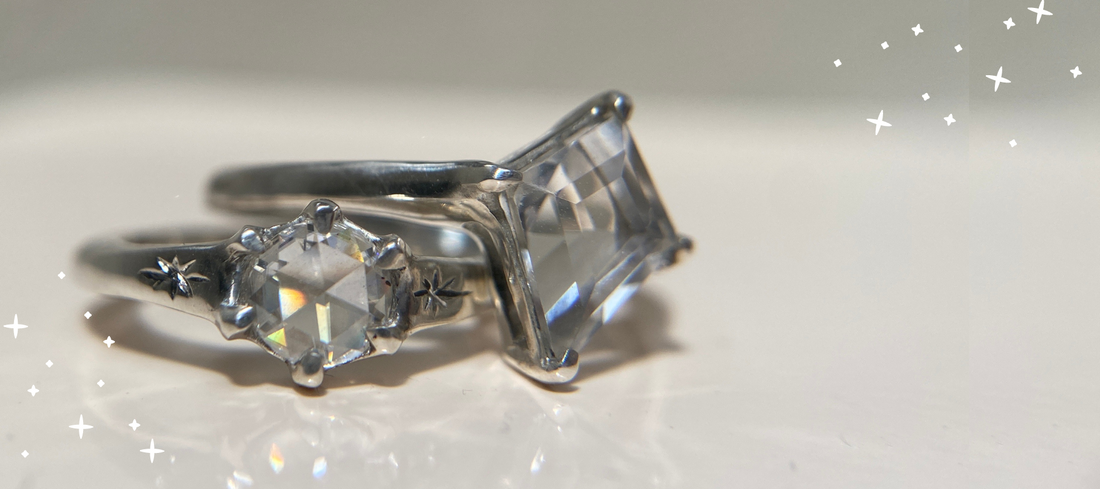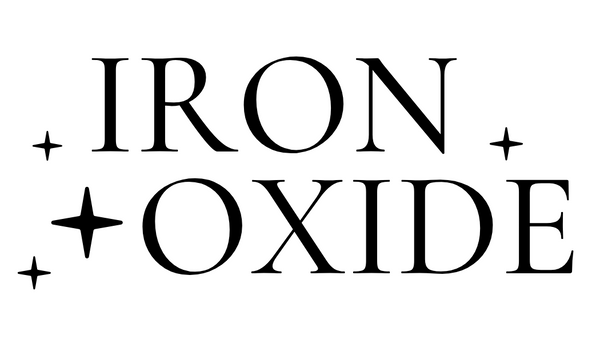
7 Reasons to Consider a Diamond Alternative
Share
If you are interested at all in sustainable fashion or ethically sourced gemstones, you probably already know that diamonds are problematic....but maybe you don't know why.
I've attempted to simplify a complex cloud of issues into a a quick list explaining why we should be choosing alternatives to diamond rings.
1. BLOOD DIAMONDS + CONFLICT STONES - You've heard these terms before, and 'blood diamonds' is probably the first thing that comes to mind when you thing about getting a diamond free engagement ring. Blood diamonds or 'conflict diamonds' are stones coming from conflict zones where violent insurrections or warlords profit off of selling diamonds. They are called this because so many people are killed or displaced in the course of getting these diamonds to American jewelry markets in order to pay for weapons and transport. Efforts like the Kimberly Process have largely failed, and solutions towards conflict-free stones still haven't been found.
2. CHILD + SLAVE LABOR - Even if a diamond (or other gemstone) is labeled conflict free, that doesn't mean it's free of human rights violations. Many stones on the market are mined or cut by children or people forced to work in terrible conditions we can hardly begin to imagine. Mining companies have found plenty of loopholes to exploit workers and children in pursuit of a profit margin.
3. ENVIRONMENTAL DEVASTATION - Soil erosion, deforestation, emissions, water supply contamination and habitat destruction are just a few problems that come with many gemstone mining efforts (not just diamonds.) A sought after resource like diamonds and gold create a lot of environmental challenges in the rush to extract it.
4. COST - Diamonds are incredibly expensive but their cost doesn't reflect a higher value of quality or even an intrinsic value. Diamond alternatives are always. a much cheaper option. It's impossible to talk about what affects the cost of diamonds without talking about the historic impact of cartels like De Beers, a diamond company that held a decades long monopoly on the market. At one point it's said that DeBeers held 85% of the the worlds diamond supply.
5. BUT AREN'T DIAMONDS RARE? - NOPE! As early as 1870, they found literal craters of diamonds in South Africa. In fact, De Beers mined so many more stones than there was demand for, that they stored warehouses of them in London and only released a certain amount each year to maintain the illusion of scarcity and drive prices up. Only as recently as 2000, has DeBeers agreed to stop stockpiling diamonds (but really only so they were legally allowed to sell to the US again, since they had been barred for doing this.)
6. A SCAM OF DESIRE - Have you ever stopped and considered why anyone really wants a diamond engagement ring, and why they are willing to pay so much for an objectively useless item? Before 1930 only 10% of engagement rings even contained a diamond. What changed? Just the introduction of what is often referred to as 'the most successful advertising campaign in history" (This article is a fascinating read if you are interested in marketing psychology.) Through a lot of different forms of advertising, De Beers convinced the world of one simple idea - that a diamond equals love and was an essential part of marriage.
7. THE MYTH OF EVERLASTING VALUE - Just like any other luxury item, the value goes way down after the initial purchase. The retail markup on diamonds is astronomical, anywhere from 200-350% and the value depreciates as soon as you drive it off the lot. Because of this, diamonds don't hold their value and shouldn't be viewed as an investment.
SO WHAT CAN WE DO?
Bottom line, If a company is not transparent about mine to market tracking, or where their stones are coming from and who is mining them, don't buy from them. The only way we can change this sort of things as consumers is to refuse to spend money with companies that do nothing, and force them to care.
Diamond engagement rings are falling out of fashion with younger, more informed shoppers for the reasons listed above. Luckily there are tons of non-traditional engagement rings like moissanite, sunstone, cubic zirconia and quartz and other diamond alternatives out there that are a better choice for an environmentally conscious wedding ring or a sustainable engagement ring.
